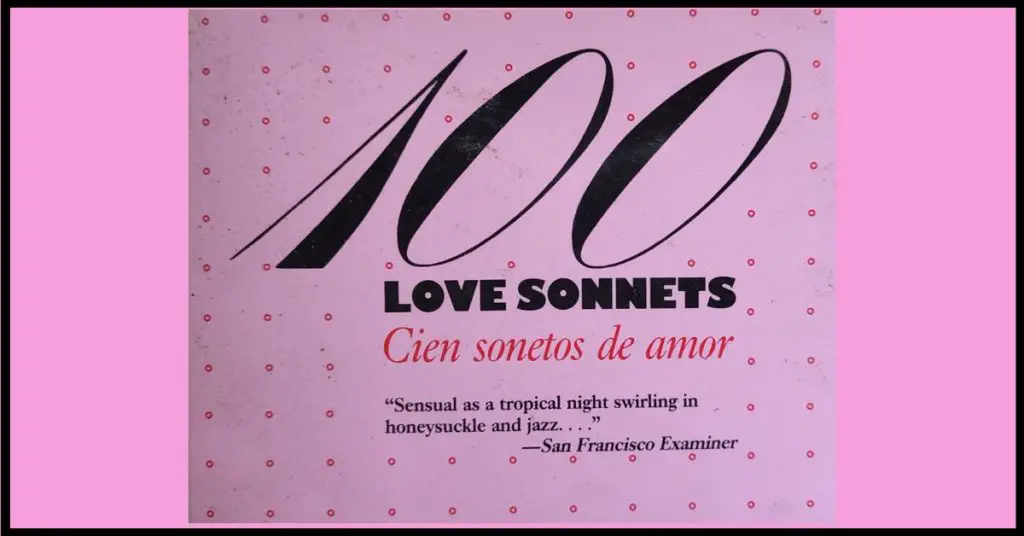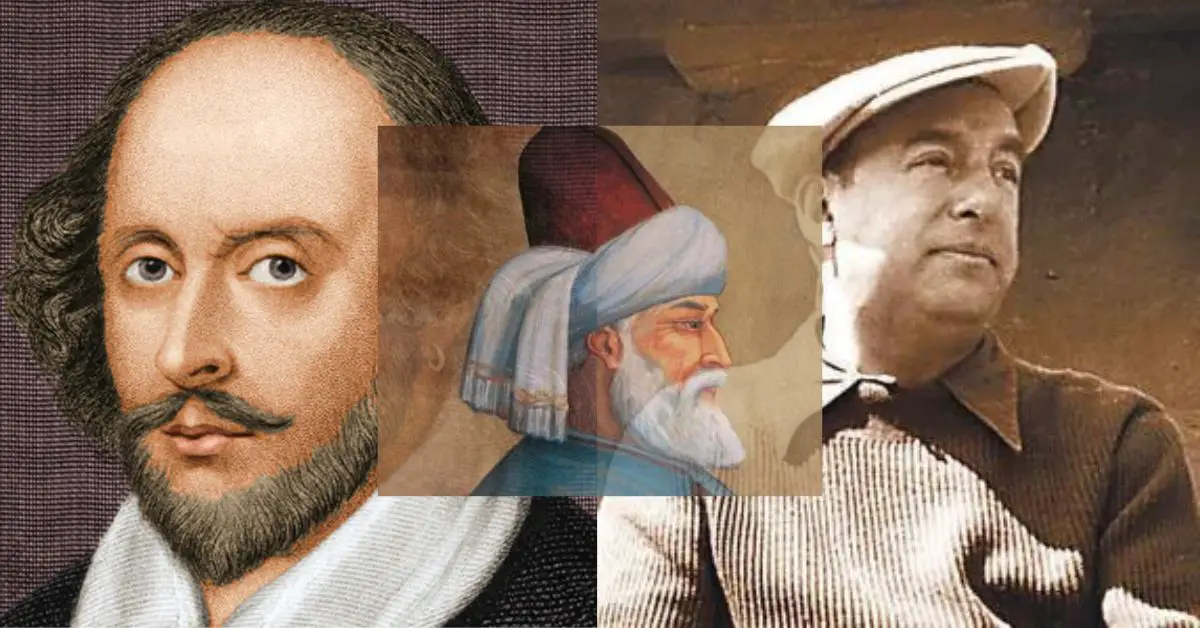Pablo Neruda Love Poems

Do you enjoy romantic poetry? Look no further than Chilean poet Pablo Neruda’s works.
Neruda has captivated readers for decades with his powerful imagery and profound expressions of love in his passionate and evocative love poems.
In this blog post, we’ll look at five of Neruda’s most famous love poems, delving into the themes and literary techniques that elevate them to the pinnacle of romantic expression.
From love’s struggles in “And Because Love Battles” to devotion in “Love Sonnet XI,” these poems will have you swooning.
This post is a must-read if you enjoy literature or are looking for inspiration for your own love life. So, let us enter Pablo Neruda’s world and discover the beauty of his love poetry.
Table of Contents
5 of the Best Pablo Neruda Love Poems
Experience the timeless beauty of Pablo Neruda’s most beloved love poems with this selection of five of his finest works.
These elegantly crafted lines will enchant and captivate your heart, offering a special insight into the wonders and complexities of romance.
Whether you are celebrating a special occasion or simply seeking inspiration for your own writing, these five Neruda poems will bring joy to your life through their unique charm.
1. And Because Love Battles
A Brief Analysis of the Poem:
In “And Because Love Battles” the poet struggles with societal pressure and inner turmoil as he attempts to confess his love to a woman.
The negative comments of others, who question his decision and create an internal conflict, highlight his struggle.
Despite these reservations, he must persevere and, in the end, make the decision to express his true feelings. Read the complete poem below:
And Because Love Battles And because love battles not only in its burning agricultures but also in the mouth of men and women, I will finish off by taking the path away to those who between my chest and your fragrance want to interpose their obscure plant. About me, nothing worse they will tell you, my love, than what I told you. I lived in the prairies before I got to know you and I did not wait love but I was laying in wait for and I jumped on the rose. What more can they tell you? I am neither good nor bad but a man, and they will then associate the danger of my life, which you know and which with your passion you shared. And good, this danger is danger of love, of complete love for all life, for all lives, and if this love brings us the death and the prisons, I am sure that your big eyes, as when I kiss them, will then close with pride, into double pride, love, with your pride and my pride. But to my ears they will come before to wear down the tour of the sweet and hard love which binds us, and they will say: “The one you love, is not a woman for you, Why do you love her? I think you could find one more beautiful, more serious, more deep, more other, you understand me, look how she’s light, and what a head she has, and look at how she dresses, and etcetera and etcetera”. And I in these lines say: Like this I want you, love, love, Like this I love you, as you dress and how your hair lifts up and how your mouth smiles, light as the water of the spring upon the pure stones, Like this I love you, beloved. To bread I do not ask to teach me but only not to lack during every day of life. I don’t know anything about light, from where it comes nor where it goes, I only want the light to light up, I do not ask to the night explanations, I wait for it and it envelops me, And so you, bread and light And shadow are. You came to my life with what you were bringing, made of light and bread and shadow I expected you, and Like this I need you, Like this I love you, and to those who want to hear tomorrow that which I will not tell them, let them read it here, and let them back off today because it is early for these arguments. Tomorrow we will only give them a leaf of the tree of our love, a leaf which will fall on the earth like if it had been made by our lips like a kiss which falls from our invincible heights to show the fire and the tenderness of a true love. by Pablo Neruda
2. Don’t Go Far Off
A Brief Analysis of the Poem:
Pablo Neruda’s masterful use of structure and line length in “Don’t Go Far Away” creates a sense of unity in the poem.
The poem is divided into tercets and quatrains, and while there is no rhyme or rhythm, the line lengths are consistent, averaging around nine to ten words.
This technique gives the poem a unified and visually appealing structure, directing the reader’s attention to the poem’s powerful emotions and messages. See the full poem below:
Don’t Go Far Off Don't go far off, not even for a day, because -- because -- I don't know how to say it: a day is long and I will be waiting for you, as in an empty station when the trains are parked off somewhere else, asleep. Don't leave me, even for an hour, because then the little drops of anguish will all run together, the smoke that roams looking for a home will drift into me, choking my lost heart. Oh, may your silhouette never dissolve on the beach; may your eyelids never flutter into the empty distance. Don't leave me for a second, my dearest, because in that moment you'll have gone so far I'll wander mazily over all the earth, asking, Will you come back? Will you leave me here, dying? by Pablo Neruda
3. Love Sonnet XI
A Brief Analysis of the Poem:
Pablo Neruda’s “Love Sonnet XI” is a poetic masterpiece that delves into the complexities of desire and human relationships.
It is a powerful exploration of the emotion of love and is one of Neruda’s most celebrated and beloved sonnets.
The poem expertly combines themes of desire, devotion, and dedication to create a memorable and moving work of art that continues to resonate with readers today.
You can read the full sonnet below:
Love Sonnet XI I crave your mouth, your voice, your hair. Silent and starving, I prowl through the streets. Bread does not nourish me, dawn disrupts me, all day I hunt for the liquid measure of your steps. I hunger for your sleek laugh, your hands the color of a savage harvest, hunger for the pale stones of your fingernails, I want to eat your skin like a whole almond. I want to eat the sunbeam flaring in your lovely body, the sovereign nose of your arrogant face, I want to eat the fleeting shade of your lashes, and I pace around hungry, sniffing the twilight, hunting for you, for your hot heart, like a puma in the barrens of Quitratue. by Pablo Neruda
4. Every Day You Play
A Brief Analysis of the Poem:
In “Every Day You Play,” Pablo Neruda depicts a speaker enraptured by their love for the listener and how this relationship has improved their life.
With eight stanzas divided into quatrains, a quintain, and a sestet, the poem flows. Neruda uses half-rhymes and occasional full rhymes to give the poem a natural feel.
The half-rhymes “eyes” and “cry” in the fifth stanza, “butterflies” in the sixth, and “eyes” in the seventh emphasize the speaker’s emotions and love.
The poem’s free-flowing structure and this technique make it emotional. Read the entire poem below:
Every Day You Play Every day you play with the light of the universe. Subtle visitor, you arrive in the flower and the water, You are more than this white head that I hold tightly as a bunch of flowers, every day, between my hands. You are like nobody since I love you. Let me spread you out among yellow garlands. Who writes your name in letters of smoke among the stars of the south? Oh let me remember you as you were before you existed. Suddenly the wind howls and bangs at my shut window. The sky is a net crammed with shadowy fish. Here all the winds let go sooner or later, all of them. The rain takes off her clothes. The birds go by, fleeing. The wind. The wind. I alone can contend against the power of men. The storm whirls dark leaves and turns loose all the boats that were moored last night to the sky. You are here. Oh, you do not run away. You will answer me to the last cry. Curl round me as though you were frightened. Even so, a strange shadow once ran through your eyes. Now, now too, little one, you bring me honeysuckle, and even your ******* smell of it. While the sad wind goes slaughtering butterflies I love you, and my happiness bites the plum of your mouth. How you must have suffered getting accustomed to me, my savage, solitary soul, my name that sends them all running. So many times we have seen the morning star burn, kissing our eyes, and over our heads the grey light unwinds in turning fans. My words rained over you, stroking you. A long time I have loved the sunned mother-of-pearl of your body. Until I even believe that you own the universe. I will bring you happy flowers from the mountains, bluebells, dark hazels, and rustic baskets of kisses. I want to do with you what spring does with the cherry trees. by Pablo Neruda
5. Night On The Island
A Brief Analysis of the Poem:
Pablo Neruda’s sensual and romantic poem “A Night on the Island” describes two lovers’ intimacy.
The speaker describes sleeping on an island with their partner. “Between pleasure and sleep, between fire and water” symbolizes their love.
The poem’s dream-like imagery enhances the theme of the lovers’ unity and their dreams coming true.
In the final stanzas, the speaker wakes up and the dawn kisses their mouth as if it came from the sea, continuing the theme of unity and love. Read the entire poem below:
A Night On The Island All night I have slept with you next to the sea, on the island. Wild and sweet you were between pleasure and sleep, between fire and water. Perhaps very late our dreams joined at the top or at the bottom, Up above like branches moved by a common wind, down below like red roots that touch. Perhaps your dream drifted from mine and through the dark sea was seeking me as before, when you did not yet exist, when without sighting you I sailed by your side, and your eyes sought what now– bread, wine, love, and anger– I heap upon you because you are the cup that was waiting for the gifts of my life. I have slept with you all night long while the dark earth spins with the living and the dead, and on waking suddenly in the midst of the shadow my arm encircled your waist. Neither night nor sleep could separate us. I have slept with you and on waking, your mouth, come from your dream, gave me the taste of earth, of sea water, of seaweed, of the depths of your life, and I received your kiss moistened by the dawn as if it came to me from the sea that surrounds us. by Pablo Neruda
Final Words on Pablo Neruda Love Poems
In conclusion, these 5 Pablo Neruda’s love poems are a testament to the power of love and the beauty of romantic poetry.
Each poem speaks to different themes, such as love as a battle, separation, devotion, playfulness, and isolation.
But all of them share a common thread of love that can evoke strong and deep emotions. Neruda’s use of powerful imagery and metaphor in these poems helps convey the depth and intensity of his feelings.
Whether you’re a fan of Neruda’s poetry or just looking for some inspiration for your own love life, these poems are sure to resonate with you.


